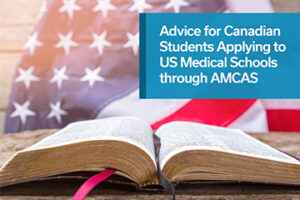A popular question I often get asked is, “Were you considered a CMG (Canadian Medical Graduate) when matching to Canada?”. I am pleased to tell you yes, I was! If you are Canadian citizen (or permanent resident) and attended an LCME accredited medical school in the USA, (i.e. the vast majority of schools in continental USA), then you are considered a CMG. This is because Canadian medical schools are also accredited by the LCME. Meaning you take the same exam as Canadian Medical Graduates to qualify for practice licensure. If you strongly wish to match back to Canada for residency, I would suggest you apply to all programs that you are willing to attend.
Another question I often get asked is, “Does your USMLE score matter for residency matching?”. I would say the answer varies based on what you are applying for. It does not matter, in that you are never evaluated on the basis of your USMLE score. In fact, you are not even required to report it as part of your application. However, you may want to include it in order to give yourself a backup plan in case you do not match in Canada. This is especially true if you are applying for a competitive specialty. I have seen very competitive candidates fail to match to Family Medicine, which has the greatest number of spots in Canada. Having a strong USMLE score would significantly strengthen your residency application in the US.
One challenge of pursuing medical education in the US is that it can be very expensive (usually at least twice as expensive as Canada). In order to finance the high tuition fees, you can turn to a Canadian banks for a line of credit, usually of up to $250,000. Not all the money is available immediately however, and some schools may require full tuition to be paid up front.
I think my US medical education prepared me to adapt to Canadian residency training somewhat well. It has given me a stronger knowledge base in the basic sciences and disease pathophysiology, which are heavily examined on the USMLE. As a result, I was well prepared for electives in Emergency Medicine and non-patient care specialties such as pathology, where the demands for knowledge are high. Even so, having trained in a different system, I find that Canadian students usually possess stronger hands-on skills and know-how. They are well organized when presenting cases, and often function at the level of a resident. I was not quite prepared to write daily orders, arrange admissions, and dictate consult notes, when I came back to Canada to do electives. Perhaps it’s just a matter of taking the time to adjust to a new system and environment. Nonetheless, the Canadian training programs and licensure exams ensure that all candidates reach a required level of competency at the end of their training.


